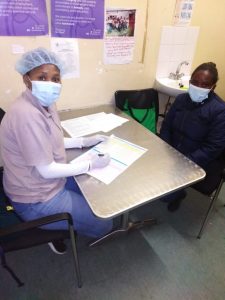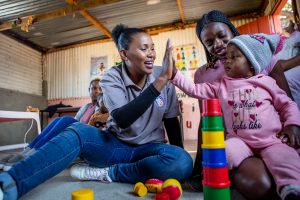m2m ensures South African clients at epicentre of COVID-19 outbreak in Africa are accessing essential health services
With South Africa facing more COVID-19 cases than anywhere on the African continent, mothers2mothers (m2m) is committed to making sure our clients are able to access essential health services, even with the many disruptions caused by the pandemic. This is critical since many of our clients in South Africa are pregnant or breastfeeding adolescent girls and young women, who are either living with HIV or at risk of contracting the virus. What’s more, people living with HIV who are not on effective treatment can face serious health challenges from COVID-19 due to their immunocompromised health status.
Lack of access to HIV treatment can have other grave consequences as well, which are of particular concern in South Africa—home to more people living with HIV than anywhere in the world (7.5 million in 2019, according to UNAIDS). UNAIDS and the World Health Organization estimate that a six-month interruption in treatment could lead to an extra 500,000 deaths globally. It could also lead to mother-to-child transmission of HIV rates almost doubling in some countries.

m2m Peer Mentor Velna Malobola (left) with a client.
Yet widespread fear and confusion are preventing people from accessing health services and treatment in South Africa, and across the African continent. Velna Malobola, an m2m Peer Mentor in Sohanguve, South Africa, describes the situation: “There is a lot of confusion because some people think the clinic is not operating due to COVID-19 cases reported there. Some people don’t know if they can go there any more to collect their medication and access medical care for non-COVID related illnesses. Other people are scared of coming to the health facility. They feel that the clinic is dangerous because people who are positive come to the clinic for help, and some frontline health workers have tested positive recently.”
Thanks to a grant from the Michael & Susan Dell Foundation, m2m has been able to adapt our service delivery approach in South Africa—as we are doing in the other eight countries in which we provide direct services—so that Peer Mentors, like Velna, can continue to support their clients to get the medical care and treatment they need at this critical time.
Among the changes—Peer Mentors have been trained to make much more intensive use of phones to deliver services—using phone calls, SMS messages, and WhatsApp chats to support their clients to access treatment, allay their fears about visiting health centres, and follow up with those who missed appointments. COVID-19 education and referrals are now included in our package of services, which also cover HIV testing and treatment, sexual and reproductive health, adolescent health, and early childhood development. To make this possible, we are digitising our sites in the Eastern and Western Cape Provinces of South Africa, including the procurement of smartphones for all frontline staff, and voice and data bundles.
Velna says this has made it possible for her to continue to do her job. “Even though I can’t hold my clients’ hands and look them in the eye, I provide the same education and support to them over the phone, and make sure they are accessing health services and treatment, and that they have all of the information and support they need to stay healthy,” says Velna.
In addition, to fight COVID-19 and strengthen our existing peer-to-peer services, m2m accelerated the development of the “Virtual Mentor Mother” Platform (VMMP)—a WhatsApp-based interactive service where new and existing clients can receive vital health information and service referrals on demand through a chatbot in over 30 languages. Phase One of the VMMP, which officially launched a couple of weeks ago, is focused on COVID-19. Phase Two, launching in October 2020, will include information about HIV, reproductive health, non-communicable diseases, early childhood development, and other critical health issues. Content tailored specifically for adolescents is also being developed, and additional interactive services will be built into the platform.
For clients who are able to make it to the health centre and meet with a Peer Mentor, like Velna, m2m has implemented social distancing guidelines to keep both staff and clients safe and healthy. We have also have procured Personal Protective Equipment (PPE) for all of our frontline staff in South Africa, and trained them on using it.

Velna working with clients in 2019.
Velna admits that at first she was scared to report to the health centre every day. “But as one of the 7.5 million people living with HIV in South Africa, I also knew that I am needed more than ever. COVID-19 poses a greater risk to those who are immunocompromised—the information I provide to women and families on HIV, COVID-19, and other health conditions is even more urgent. So I said ‘count me in.’ I once found strength to turn my terrifying HIV diagnosis into a mission for my community. I had to find this strength again to help my peers stay healthy and safe,” she says.
For more information on the work brave women like Velna are doing in South Africa and nine other countries where we operate, read the story that the Michael & Susan Dell Foundation recently posted on their website.






















